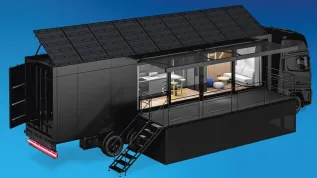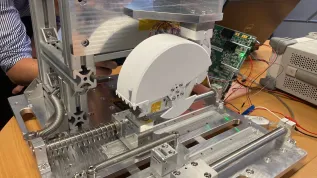
"Mr. Andrzej it is my pleasure to greet you from Copenhagen Greetings to all at CIUW" - this is the content of e-mail sent 25 years ago from Copenhagen to Warsaw. This message is sometimes considered the first Polish e-mail- told PAP the author of the message, Tadeusz Węgrzynowski.
The e-mail was received in Warsaw on Tuesday, 17 July 1990 at 2:01:20 P.M. It was titled "Hello from Copenhagen". The author was the then director of the University of Warsaw Information Technology Centre (CI UW) - Tadeusz Węgrzynowski, and the addressee - Andrew Smereczynski of CI UW, administrator of PLEARN - just launched server Polish European Academic and Research Network (EARN). The printout of this first email is difficult to decipher today, letters and numbers almost completely faded. On the printout there are blue felt-tip pen notes: "Europe is knocking on the door (of a computer)!!!" and: "Who does not want, let them not believe".
The e-mail was a proof of a successful launch of the first connection to the EARN BITNET network, which was competitive to the Internet. Tadeusz Węgrzynowski - today Head of Telecommunication at Warsaw University of Technology - recalls that after a month the number of email users at CI UW reached the first thousand. Gradually further nodes in the country were connected to PLEARN (there were 22 nodes). The Internet came to Poland one year later and quickly led to major changes in electronic communication. Therefore, 17 August 1991 is often considered the breakthrough date for the development of electronic mail in Poland. On that day the first Polish e-mail was sent via the Internet. Węgrzynowski stressed, however, that by the time of approval for the use of the Internet in Poland, there were already about 10 thousand e-mail users.
"Even in the late 80s, all the advanced technologies were reserved for Western countries. After the political changes of 1989, the first step was to also allow Poland to join the EARN BITNET academic network. The barrier between Poland and Western countries was very large. E-mail was a symbol of connecting with the Western world" - said Węgrzynowski.
When the Polish Post Office activated a telephone link with Denmark in the 1990s, CI UW staff ordered two pairs of links for data transmission. Węgrzynowski recalled that on 16 July 1990 he flew to Copenhagen to start the link between the PLEARN node at CI UW and DKEARN in Lyngby near Copenhagen. He carried a modem that was needed to launch PLEARN on a computer with a capacity of ... 3 MB. On the next day, at 2:01 P.M. he sent the first e-mail with greetings for the CI UW from DK EARN. "I also saw then that PLEARN, our node in Poland, is beginning to be recognized around the world - information about this were coming from various servers. For me, it was associated with great fear. In the end, I launched something that could turn out to be Pandora\'s box..." - he described.
It was an important event for the academic and scientific community, which allowed for contact via email with the users of computer networks EARN, BITNET and emerging Internet. Since the connection to EARN network, the ICT field began to practically develop in Poland.
PAP - Science and Scholarship in Poland, Ludwika Tomala
lt/ agt/
tr. RL













